North Carolina’s New K-12 Standards Push Critical Race Theory Deep Into Curriculum
Driven by an “anti-racist, pro-equity consultant” who was handpicked to serve on the State Board of Education.
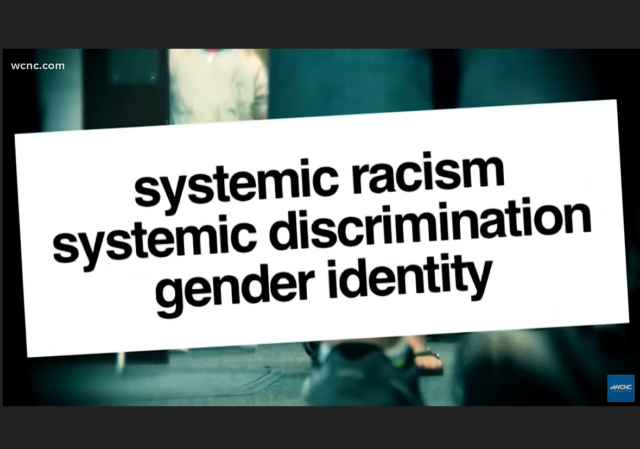
By now, you likely know all about the controversy surrounding California’s neo-Marxist Critical Theory-based Ethnic Studies Model Curriculum for K-12 schools. What you might not know is that California is not the only one. In fact, North Carolina, of all places, has been fighting a Critical Theory curriculum battle of its own.
[toc]
Introduction
We’ve written and spoken quite a bit about the advancement of neo-Marxist ideologies in culture and education of late. Our coverage of the phenomenon in California includes:
- Critical Race-Based California Ethnic Studies Curriculum Passes State Board of Education Vote
- California ‘Ethnic Studies Curriculum’ Proposal Gets Worse, Heavy On Critical Race Theory and Anti-Israel Activism
- California Proposed Ethnic Studies Curriculum A Subterfuge For Anti-American And Anti-Zionist Activism
- Legal Insurrection Foundation opposes proposed anti-Israel public school curriculum in California
We’ve also hosted several Zoom webinars on Critical Race Theory in higher ed and K-12, including:
We even launched a brand new website, criticalrace.org, which tracks the implementation Critical Race Theory-based programs at universities (and will eventually do the same for K-12 schools) around the country.
***
I first learned of North Carolina’s Critical Theory Creep (as I’ve been calling it in my head) from local North Carolina activist and writer Sloan Rachmuth. Sloan serves as president of Education First Alliance, a conservative grassroots organization fighting against Critical Race Theory and for “morality, achievement & patriotism” in North Carolina schools.
Last Wednesday, March 17, Sloan and fellow activists held a webinar about the issue. I attended and learned that Critical Theory and similar political ideologies have featured in the North Carolina public school system for several years—despite considerable community pushback. Now, North Carolinian Critical Theory advocates’ latest push—including the recent passage of new Social Studies curricular standards that echo the troubling themes of California’s ESMC—have thrust the North Carolina Department of Public Instruction’s (NCDPI) “anti-racist” foibles into the national news cycle.
New Social Studies Curriculum Standards
Among the most controversial developments in the North Carolina Critical Theory saga is a new Social Studies curriculum standards for Kindergarten through 12th grade. The Standards have been in development since 2019; four different drafts have been rejected in State Board of Education (SBOE) votes in the last two years.
In a February 4th, 2021 meeting, the SBOE officially approved the fifth version of the Standards in a 7 to 5 vote; the SBOE now plans to begin implementing the curriculum standards throughout North Carolina at the start of the 2021-2022 school year.
The Standards’ revision and review process seems to have been a contentious one; as the Washington Free Beacon reported on February 4,
Members of the State Board of Education—most of whom were selected by Democratic governor Roy Cooper—voted to adopt the updated curriculum despite opposition from Republican lieutenant governor Mark Robinson, who said the new standards reflect the board’s political agenda and “indoctrinate our students against our great country.”
(You can see the entire packet of newly passed standards here or below.)
New North Carolina Social Studies Curriculum Guidelines by Samantha Mandeles on Scribd
Meet the “Anti-Racist” Activist Pushing New Standards
Robinson’s concern about the draft Standards has led him to lock horns with fellow SBOE member and new Standards champion, James E. Ford. Ford, a self-described “educator, advocate, and believer”, has reportedly been a main driver behind the decision to revamp the old Standards, and the new version’s infusion with Critical Theory-esque dogma. Indeed, he even
thwarted a modified set of standards slated to pass last summer and demanded that history lessons include more precise definitions of marginalized groups. One draft of the standards included teaching kindergartners about “systemic racism” and “gender identity.”
This is not surprising; Ford, who was hand-selected to site on the SBOE by North Carolina governor Roy Cooper in 2018, has been quite open about his “life’s work” of “dismantling white supremacy”, his admiration for Karl Marx, and his so-called “anti-racist, pro-equity” politics.
Hi new followers! Allow me to introduce myself. I'm James — an educator, advocate, and believer. My life's work is unapologetically exposing and dismantling racism/white supremacy in all it's manifestations, as compelled by my faith. I speak for myself, unashamedly. Welcome! ✊?
— James E. Ford (@JEFordNCTOY) August 20, 2020
Folks really out here making Karl Marx look like a prophet.
— James E. Ford (@JEFordNCTOY) February 1, 2020
Why equity cannot be optional or voluntary https://t.co/MssVqiWQNv
— James E. Ford (@JEFordNCTOY) March 22, 2021
Judging by the global size and scale, #BlackLivesMatter is becoming an international movement against White Supremacy. The popular education that will come out of this will be earth shaking. It’s long overdue but I plan to play my part. Let it begin…
— James E. Ford (@JEFordNCTOY) June 20, 2020
“Anti-Racist” Racism
Ford’s advocacy for new curricular standards is not the only way in which he has inspired local outrage; for example, his incendiary Twitter feed and commentary on White Americans has prompted some to argue against his remaining a member of the SBOE. As Sloan Rachmuth reported on her organization’s blog last week,
…[In 2020] former State Superintendent Mark Johnson…pointed to Ford’s anti-white bias as a sign of his unfitness to serve on the State Board of Education following this tweet:
Local Raleigh media outlet The News and Observer documented,
On Thursday, Johnson publicly released a letter to Ford saying it’s “unacceptable to equate middle-of-the-road North Carolinians to being racists.” Johnson noted thatFord leads the board’s strategic planning committee, which is responsible for drafting a plan to improve opportunities and equity for all students and educators.
But, as Sloan noted,
Instead of apologizing for offending taxpayers in North Carolina, Ford published a defiant response that painted Superintendent Johnson, and everyone else troubled by his comments, as an out-of-touch racist.
A lot of White Americans, I believe, in their hearts, feel Black Americans should just stop bitching. Yes you’re a 2nd class citizen. But just be happy you live in the “greatest nation on earth” and deal with your position quietly. Some oblige, but for the most part THAT AINT US!
— James E. Ford (@JEFordNCTOY) June 2, 2020
Of course, those Black Americans Ford judges as the ones who “oblige” apparently deserve public condescension and require his corrective instructions.
Nah. This ain't it. Empathize with your fellow Black folks who are tired to the boundaries of Blackness being policed by white people, who then take our votes for granted. Didn't you write a book called the "End of White Politics"? Help me out here…
— James E. Ford (@JEFordNCTOY) May 22, 2020
Meanwhile, like many other proponents of the “anti-racist” movement, Ford actually seems to have little trouble embracing bigots—as long as those bigots direct their ire at Jews. In fact, as Sloan discovered, Ford is an avid supporter of the incendiary and notoriously anti-Semitic preacher Jeremiah White—whose
infamous “God Damn America” sermon surfaced in 2008 while the reverend was serving as then-presidential candidate Barack Obama’s spiritual adviser. In that speech, Wright compared American leaders to al Qaeda and said the U.S. government manufactured the AIDS epidemic to kill black people.
Obama distanced himself from Wright and denounced his sermon. Wright blamed “them Jews” for the rift.
“Non-negotiable” Dogmas Applied in Education
Still, Ford has remained a SBOE member and seems determined to use his position there and as an educator to impose his political and ideological will on the North Carolina school system. He is open about his plans to “pressure” others to accept his views, which include the bizarre belief that “white grievance politics” has been the dominant factor in determining the entire course of American history.
I will not accept normal. I want to be free. I want my people to be free. I want white supremacy to be uprooted and destroyed. None of this is negotiable. I don't care your party affiliation or what you look like. You're either with that or you aren't.
— James E. Ford (@JEFordNCTOY) January 21, 2021
I, for one, appreciate his candor…in a weird way. He exposes what are true "identity politics". He, and all his enablers are entrenched in white grievance politics. To be fair, that's most of what's determined US history. But the accusation from these types is a projection.
— James E. Ford (@JEFordNCTOY) August 4, 2020
This odd assertion is especially troubling given Ford’s background as a history teacher, but there’s more. For instance, Ford charges that the American education system, writ large, “deliberately enforces white supremacy”; Ford is thus determined to remedy this “mythology” by pushing for policy and curricular changes he believes are appropriate—regardless of how North Carolinian taxpayers may feel about those changes.
No, your not. You’ve just been failed by the American education system that deliberately reinforcing white supremacy by miseducating the masses about everyone else. Give yourself some grace. https://t.co/XWGAo32mCd
— James E. Ford (@JEFordNCTOY) June 19, 2020
The fight for US mythology continues. The necessity to preserve the narrative in education is ESSENTIAL to white supremacy. But it’s too late, the populous has grown curious. They want the truth. There is no turning back. What’s hidden in dark come to light. https://t.co/4EhOdPAVEu
— James E. Ford (@JEFordNCTOY) July 26, 2020
REMINDER: This evening we’ll be having a candid conversation about how white supremacy shapes the education system in NC via increased interactions with the justice system. Check us out! https://t.co/gJcWSWxw6n #ThisIsOurCREED pic.twitter.com/NrjobV0Gim
— James E. Ford (@JEFordNCTOY) September 14, 2020
Indeed, Sloan Rachmuth also unearthed evidence of Ford’s disdain for police, which, she writes, has informed his reported efforts to remove security officers from North Carolina public schools.
Pushing the Standards Forward
So it was that the February 3-4th SBOE meeting saw James Ford still pushing the new Social Studies Standards forwards—despite the fact that a petition opposing them, launched by Lt. Governor Mark Robinson only days earlier, had already gathered a reported 30, 000 signatures.
Robinson, who on Saturday launched a petition against the standards that has so far received more than 30,000 signatures, said at Thursday’s education board meeting that many North Carolinians either oppose the new standards or are unaware of the curriculum’s new content.
“For whatever reason, there are many, many North Carolinians that were not aware of these standards,” Robinson said. “In four days, we had contact with over 30,000 people that are diametrically opposed to these standards. They have serious concerns about them. … Moving forward with this is irresponsible.”
Still, not only did Ford continue to endorse the Standards, he also proposed a substitute motion for the adoption of the previously rejected fourth version of the document—which Ford deemed superior due to its use of the Critical Theory buzzwords (such as “systemic racism”) for which Ford has long lobbied.
(You can watch the SBOE’s February 4 discussion of the Standards below; or see the official meeting minutes here.)
Indeed, local news outlet The North State Journal described Ford’s dogged insistence on the inclusion of those buzzwords during an earlier January 2021 SBOE meeting regarding the Standards (emphasis added):
“If we’re being honest and forthright, this debate is connected to a much longer, a much broader national discourse,” said Ford during the meeting.
He said he was an advisor when the revised AP U.S. History framework was being debated, and that “the same arguments [against that framework] were being lodged,” such as focusing too much on “subjugation and oppression of black and LatinX and Native American folk… it doesn’t play up enough of American exceptionalism, etcetera.”
Ford said there was no legitimate debate to be had over whether systemic racism existed or not, and to pretend there is was like debating whether the earth is flat. Near the end of his remarks, Ford said he thought the [fourth draft] standards “do a good job,” and remarked that “it’s not as if they [the standards] don’t address American exceptionalism; they talk about critiquing that… Our job here is not to rescue America from constructive critique or to project optimism. What we need is not the power of positive thinking.”
By contrast, Terry Stoops, director of the John Locke Foundation’s Center for Effective Education, argued,
North Carolina needs social studies standards focused on providing students a balanced perspective of American history. Lt. Gov. Robinson and his allies on the State Board of Education are not demanding that state education officials create standards that sugarcoat history. Instead, they are asking for standards that give equal weight to the nation’s failures and successes.
Elsewhere, Stoops further remarked that the Standards’ problem is not the inclusion of too much “positive thinking”, but that they
ail to balance the study between individual and common identity. He argued those who oppose the standards don’t fear addressing the dark sides of America’s past but, rather, “object to making bigotry the beginning, middle, and end of the American story.”
“Objection to the standards is not that they highlight disturbing parts of our history, but that they fail to balance between good and bad, evil and righteous,” Stoops told the Washington Free Beacon. “America’s history reflects both of those extremes. And the standards as they are written prefer to talk about one side of the American story and fail to highlight the common good, the need for national unity, and the idea that we can be a common nation and share common ideals while still being individual groups.”
Critical Theory Compromises
In the end, these and other objections failed to move a majority in the North Carolina SBOE; though Draft Five of the Standards (those that were officially passed by the Board) do not include some of the buzzwords for which Ford argued, it does include a new “preamble“—written by NC Superintendent of Public Instruction Catherine Truitt—that casts citizen opposition to the Standards as a manifestation of ignorance as to the importance of studying “geography, civics, and history”.
Students in North Carolina public schools study history throughout the entirety of their public school experience. While the public at large might not agree as to why it is important that students learn geography, civics, and history, the North Carolina State Board of Education believes that our collective social studies standards must reflect the nation’s diversity and that the successes, contributions, and struggles of multiple groups and individuals should be included. This means teaching the hard truths of Native American oppression, anti-Catholicism, exploitation of child labor, and Jim Crow to name a few, while simultaneously teaching that the US Constitution created the world’s first organized democracy since ancient Rome and that than 90 years into our country’s history, President Lincoln ended the United States’ participation in what had been more than 9,000 years of legalized slavery and human bondage in most parts of the world.
Moreover, the final version of the Standards still shows a distressing reliance on Critical Theory doctrine: for the most part, it frames history in terms of “privilege” and oppression; treats “systemic” disenfranchisement as a given without considering (or asking students to consider) how a “system” is defined; associates “the experiences and achievements” of “historically marginalized groups” almost exclusively with positive societal development, and displays a constant focus on questions of personal and group “identities”.
For example, under these new Standards, students will learn:
- to “explain how slavery, xenophobia, disenfranchisement, and intolerance have affected individual and group perspectives of themselves as Americans.”
- to “compare how some groups in American society have benefited from economic policies while other groups have been systemically denied the same benefits.”
- “how various indigenous, religious, gender, and racial groups advocate for freedom and equality.”
- to “explain how individual values and societal norms contribute to institutional discrimination and the marginalization of minority groups living under the American system of government.”
-
to “critique the extent to which women, indigenous, religious, racial, ability, and identity groups have had access to justice as established in the founding principles of government.”
- to “explain how the experiences and achievements of minorities and marginalized peoples have contributed to the protection of individual rights and ‘equality and justice for all’ over time.”
-
to “compare access to democratic rights and freedoms of various indigenous, religious, racial, gender, ability and identity groups in North Carolina and the nation.”
- to “distinguish the role women, indigenous groups, and racial minorities have played in contributing to the economic prosperity of North Carolina in terms of equity, equality, and mobility.”
- to “critique multiple perspectives of American identity in terms of oppression, stereotypes, diversity, inclusion, and exclusion.”
- to “explain how the experiences and achievements of minorities and marginalized peoples have contributed to American identity over time in terms of the struggle against bias, racism, oppression, and discrimination.”
- to “distinguish the extent to which American foreign policy has advanced the interests of historically privileged groups over the interests of historically marginalized groups.”
Conclusion
The Scientific Method teaches us that the pursuit of truth begins with a question (and no forgone conclusions), continues with the collection and interpretation of all relevant data, and leads to the formulation of a conclusion based on that data. But Critical Theory and its offshoots (including Critical Race Theory and Critical Ethnic Studies) begin with with conclusions—which, it is assumed, are not only factually unassailable, but morally correct—and then gather (cherry-picking all the way) evidence that support those conclusions.
The influence of Critical Theory on these Standards are clear. Instead of asking students to investigate, for example, if “some groups have benefited from [certain] economic policies”; if “other groups have been systematically denied the same benefits”; if such groups are defined by certain commonalities (perhaps behavioral? Perhaps racial? Perhaps none at all?); or if benefits are dispensed to certain groups “systemically”, the Social Studies curricular guidelines teach students to regurgitate carefully curated explanations of a pre-established world-view.
It’s thus easy to why James Ford advocated so strongly for their adoption: like Ford, the Standards promote the message that some ideas (i.e. the supposedly “systemic” nature of American racism) are not up for debate, even in school. And like Ford, the new Social Studies Standards will help foster intellectual poverty and an unquestioning acceptance of doctrine in North Carolina’s educational community.
But, as that great philosopher and champion of empiricism, Sir Karl R. Popper, once said, “No rational argument will have a rational effect on a man who does not want to adopt a rational attitude.” He was right, and North Carolina’s children will pay the price.
———–
Samantha Mandeles is Senior Researcher and Outreach Director at the Legal Insurrection Foundation. You can contact her on Twitter at @SRMandeles.
 DONATE
DONATE
Donations tax deductible
to the full extent allowed by law.

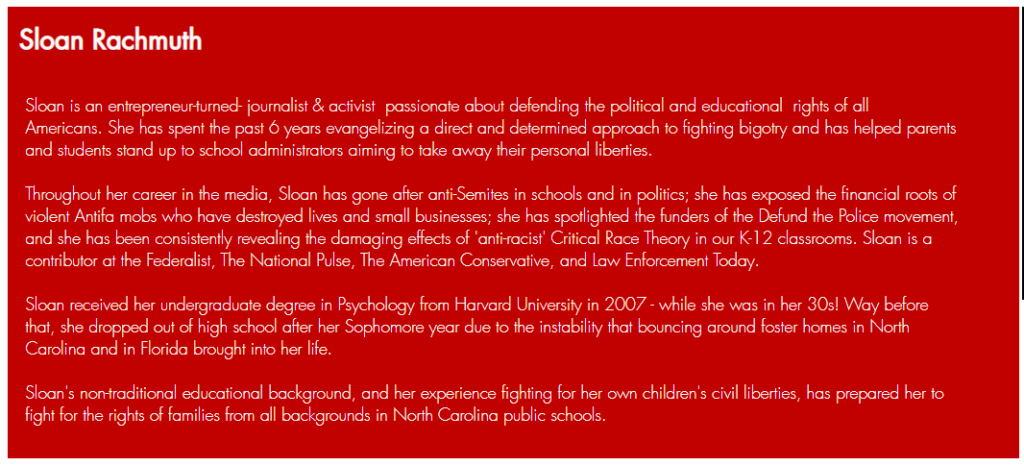
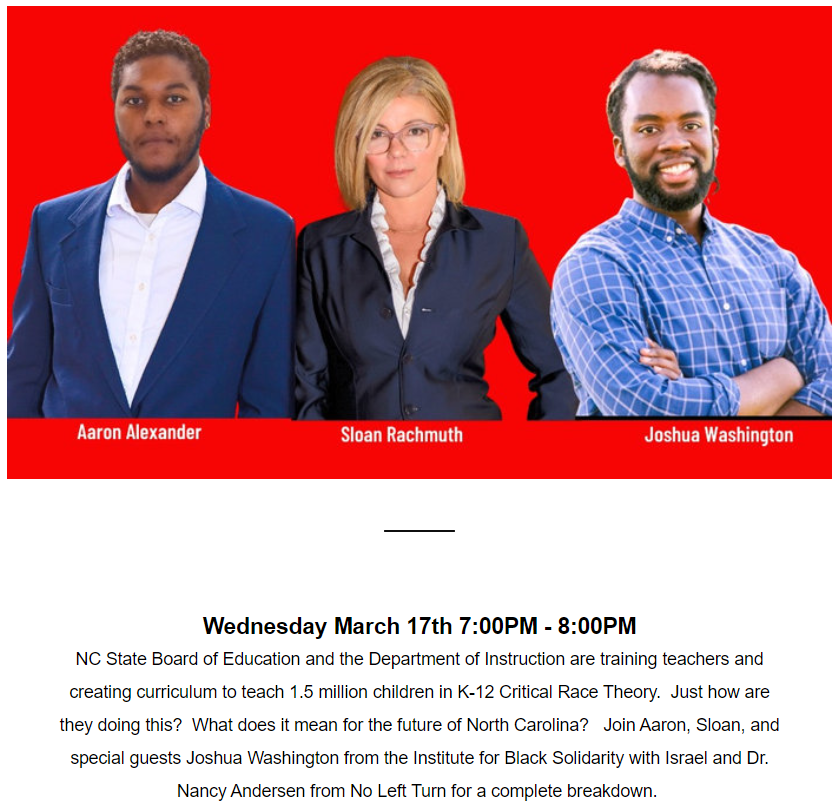
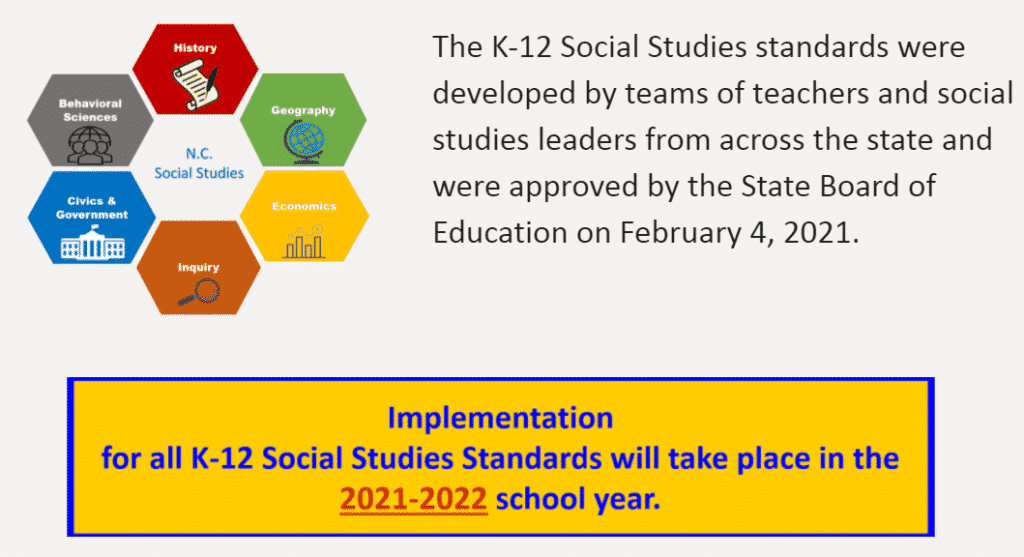
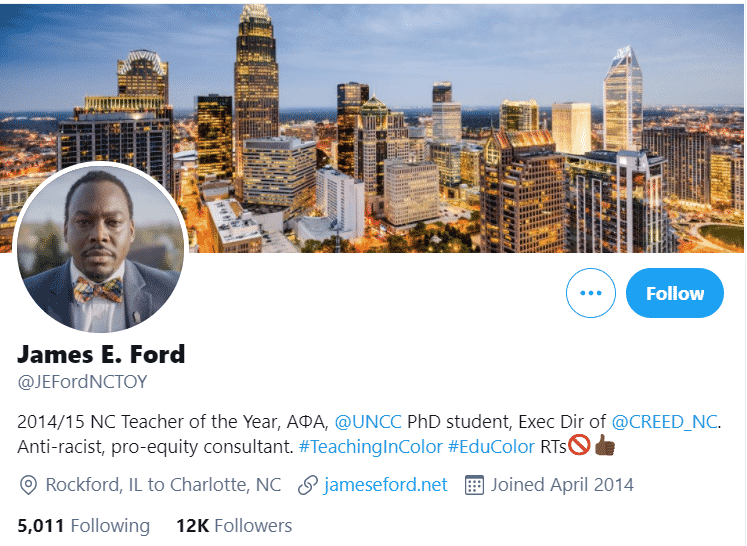



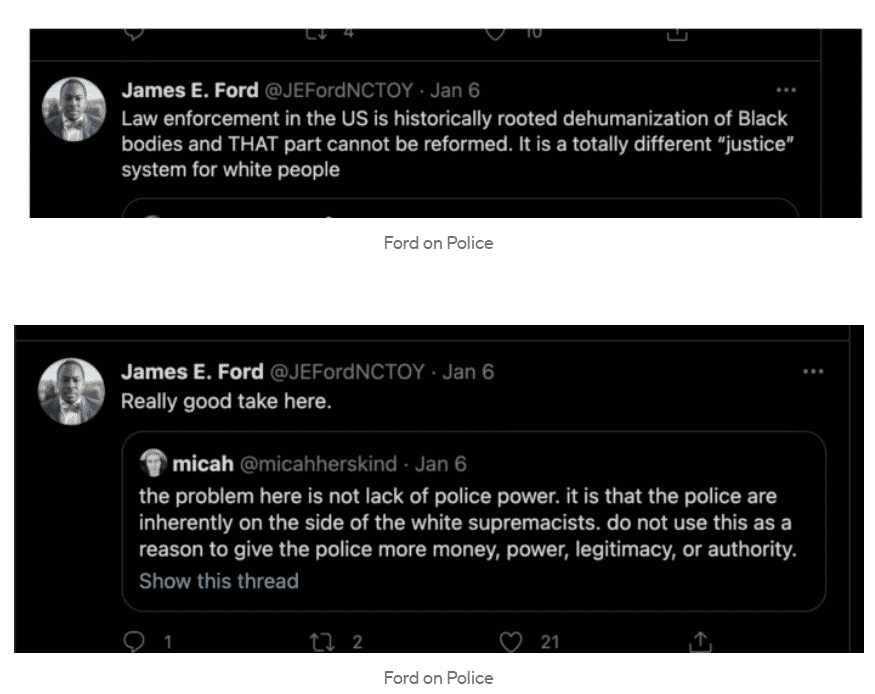
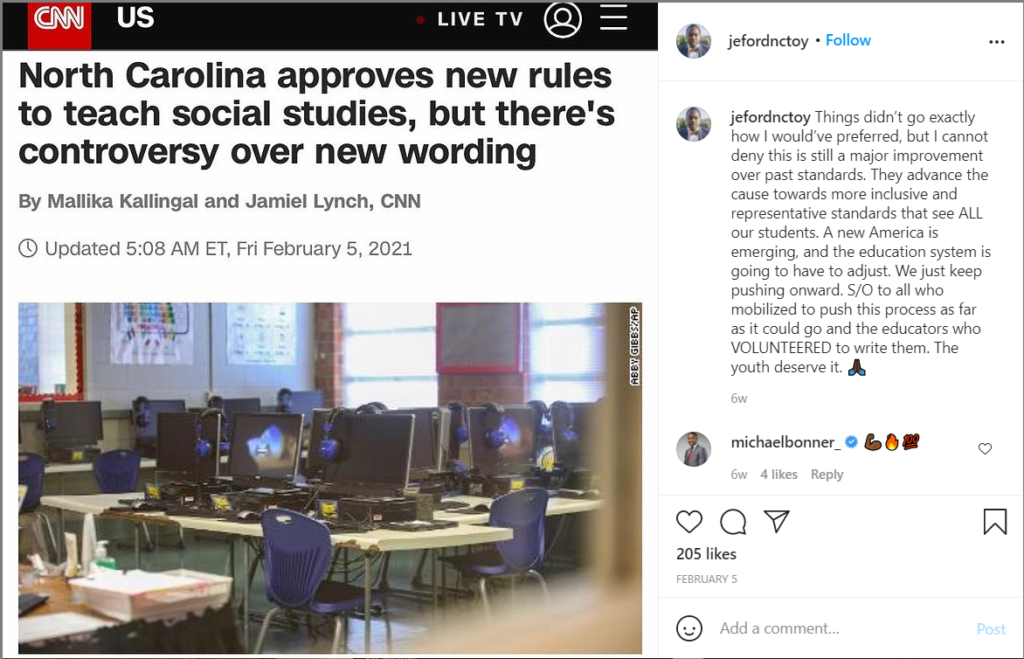








Comments
We live in NC. All of my extended family pulled their kids out of public schools and into private religious schools around twenty years ago. The latest generation has been home-schooled. Please note that this occurred when busing to fight segregation was over, and was not done to avoid being exposed to other races but to stop the marxist indoctrination of the kids.
Marxist indoctrination moves into K-12 public schools. Taxpayers are paying for it. They have no say in the matter. No dissent allowed.
How long before they start renaming schools after Marx and Engels?
Nah, Marx and Engels were white. They’ll go with something like Angela Davis.
I would like to know if the state legislature is too busy dealing with the top tax rate to address issues in education in the state and if not are there a couple of safe red seats that could be primaries for someone serious about governing?
James Ford forgot to mention that he has no marketable skills other than whining.
I’d like to know what benefits blacks are being denied. This fool seems to confuse means with ends.